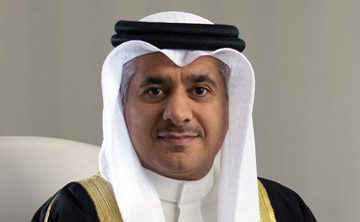ID :
493911
Wed, 05/30/2018 - 16:30
Auther :
Shortlink :
https://www.oananews.org//node/493911
The shortlink copeid
BAC posts BD13 m net profit in 2017

Manama, May 30 (BNA): Minister of Transportation and Telecommunications and Gulf Air Group (GFG) Chairman, Kamal bin Ahmed Mohammed announced that Bahrain Airport Company (BAC), the operator and managing body of Bahrain International Airport (BIA), achieved a BD12.9 million net profit for 2017, compared to BD7.6 million in the previous year.
The announcement came during a Ramadan Ghabga held at the Wyndham Grand hotel, which was organised by BAC for its partners, and attended by representatives of Gulf Air, Bahrain Airport Services, Bahrain Duty Free Company, Government Authorities representatives, Airlines operating at BIA, travel companies, air cargo companies, and the media.
The minister said: “These impressive figures are the result of the immense collaborative efforts between our team and partners, as well as improvements made to BIA’s infrastructure and services as part of the ongoing Airport Modernisation Programme (AMP), which will enhance BIA’s role in the local economy in line with Bahrain’s Vision 2030. These financial results reflect a 20 per cent spike in revenues, from BD35 million at the end of 2016 to BD42 million in 2017. This can be attributed to a general increase in BIA’s activities, including a 10% increase in air cargo traffic during 2017, which not only demonstrates BIA’s capacity to handle significantly large volumes, but also reflects the Kingdom’s growing status as a hub for logistics operations in the region. In addition, we saw a marked increase in new airlines operating at BIA, including Ethiopian Airlines, Atlas Global Airlines, and Wataniya Airways, which accounts for the increased landing fees and heavy footfall through our retail areas.”
He added: “With our solid financial position, growing order books, and a promising operating environment, we are optimistic that we can build on our success in 2018. Looking further ahead, the launch of the new Passenger Terminal Building, which will increase BIA’s capacity to 14 million passengers a year, is expected to drive even greater growth across both aero and non-aero revenue streams.”
These two revenue streams experienced significant growth in 2017, with aero income increasing by 24% and non-aero income up by almost 14%. The main contributors to aero revenue growth were passenger service charges, at 61.1% of the total, and landing fees at 21.7%. The increase in non-aero revenues is largely due to retail concession income, which makes up 41.5%, followed by property and real estate at 23.9%.
On another note, BAC also signed a three-year airfield maintenance services agreement, with the possibility of an extension, with Nass Group, which is to be carried out by Nass Asphalt. The agreement was signed on behalf of Nass Group by the Financial Director, Adel Abdullah Nass, and in attendance were BAC CEO, Mohamed Yousif Al Binfalah, BAC Chief Development and Technical Officer, Engineer Abdulla Janahi, Nass Asphalt General Manger Gerard Houghton, and Nass Asphalt Operation Manager John McKinney.
Following the signing, the minister said: “We are happy to sign this agreement, which is a good example of our partnerships with local companies, one of the pillars of the Kingdom’s economic development. This deal aims to provide maintenance services in the airport’s airside in line with the requirements of Civil Aviation Affairs and the International Civil Aviation Organisation (ICAO), resulting in a streamlining of operations at BIA.”
Nass Group financial director, Adel Abdulla Nass said: “Nass is looking forward to have a long and steadfast partnership with BAC, by maintaining BIA’s existing infrastructure to the highest standard. We are proud to be given this opportunity to be part of the airport’s major developments, which form an integral part of Bahrain’s future economic strategy.”
Nass Group won the contract following a public tender that included bids from six road contractors classified as AA Class by the Ministry of Works. Nass Group won the contract following a public tender that included bids from six road contractors classified as AA Class by the Ministry of Works.





